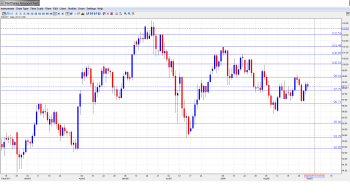The USD/JPY dropped sharply early in the week, but recovered most of these losses. The pair closed just above the 98 line, at 98.12. This week is fairly quiet, highlighted by the BOJ Monetary Policy Statement. Here’s an outlook for the Japanese events and an updated technical analysis for USD/JPY.
The yen got a boost as Japanese inflation numbers met expectations. In the US, manufacturing and housing numbers were weak, but GDP and employment numbers were solid.
[do action=”autoupdate” tag=”USDJPYUpdate”/]USD/JPY daily chart with support and resistance lines on it. Click to enlarge:
- Capital Spending: Sunday, 23:50. This indicator measures the value of new capital spending by businesses, and its release every quarter magnifies its impact. The indicator has posted declines over the past two quarters and the downward trend is expected to continue, with an estimate of a -2% decline for Q2.
- Monetary Base: Monday, 23:50. Monetary Base continues to rise, although the past two releases have fallen short of their estimates. The markets are expecting another rise in the indicator, with the estimate standing at 41.3%.
- Average Cash Earnings: Tuesday, 1:30. Average Cash Earnings is an important gauge of consumer spending, which is a critical component of economic growth. The indicator rose just 0.1% in the previous release, but the markets are expecting a sharp gain of 0.8% in the August release.
- 10-year Bond Auction: Tuesday, 3:45. Yields on 10-year bonds have not shown much movement in recent releases, with the average yield for the previous release coming in at 0.80%. No substantial change is expected in the yield of the upcoming auction.
- BOJ Monetary Policy Statement: Thursday, Tentative. This is the key event of the week. The monetary policy statement contains the outcome of the BOJ’s decision on interest rates and may offer clues as to future monetary policy. A press conference will follow.
- BOJ Monthly Report: Friday, 5:00. The monthly report contains an analysis of current and future economic conditions, but is a minor release and is unlikely to have a strong impact on USD/JPY.
USD/JPY Technical Analysis
- Technical lines from top to bottom
We start with resistance at the round number of 104. This line was a key line in May 2008. At that time, USD/JPY was in the midst of a rally which saw the pair climb as high as 110.
102.50 was an important resistance line in late May but has been quiet since that time.
101.44 was the post-crisis high seen in April 2009, and has not been tested since mid-July. 100.85 was busy in July as the dollar pushed above the 100 level.
The significant 100 level saw a lot of activity in July. With the pair losing some ground, this line has some breathing room.
98.90 was breached last week but remained intact at week’s end as a resistance line. It could be tested by the pair early in the week.
97.80 is providing support to USD/JPY. This line was quite busy in June and in late July and held firm this week as the pair dropped sharply.
96.71 is the next support line. This is followed by the round number of 95, a psychologically significant line. It continues to provide support and was last tested in mid-June.
93.79 marked the low point of a rally by the dollar which started in mid-June and saw the pair climb to the mid-101 range in July.
92.86 saw action in early March and again in early April. The latter date marked the low point of a dollar rally which saw USD/JPY climb very close to the 100 level.
I am bullish on USD/JPY
The markets continue to speculate that the Federal Reserve could pull the trigger on QE tapering as early as September, and such talk is bullish for the dollar. Japanese inflation indicators were solid last week, indicating that the Japanese economy is responding to Abenomics. Analysts will be paying close attention as the BOJ releases a policy statement late in the week, and this event could be the market-mover of the week.
- For a broad view of all the week’s major events worldwide, read the USD outlook.
- For EUR/USD, check out the Euro to Dollar forecast.
- For GBP/USD (cable), look into the British Pound forecast.
- For the Australian dollar (Aussie), check out the AUD to USD forecast.
- For USD/CAD (loonie), check out the Canadian dollar forecast.

